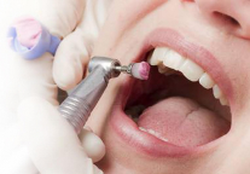General dental hygiene is important. Regular daily brushing of teeth together with a regular professional cleaning procedure at the dentist help prevent oral cavities, periodontal disease and gingivitis and other dental infections.
Also general teeth cleaning helps to remove dental plaque Traditional teeth cleaning involves the removal of plaque and tartar build up. The plaque is a sticky, soft film of bacteria and tartar is a calculus scale.(calcium build up) Our teeth are continually bathed in our saliva which is full of bacteria, calcium and other chemicals which help to strengthen and protect our teeth. This of course is good, but the downside is that it also tends to build up as a chalky substance similar to lime scale deposits in a kettle or a pipe. This build up is usually tooth coloured but sometimes develops a colour between brown and black. The biggest downside of this calculus build up is that eventually it creates the perfect conditions for bacteria growth right next to the gums. The main purpose of teeth cleaning then, is to remove any build up and then more importantly render the surface of the teeth clean and smooth such that bacteria is not able to stick to it. After the professional teeth scaling or dental cleaning regular home teeth brushing with a suitable tooth paste should now have a better chance of keeping off the bacteria and any scale build up. The most important reason for regular teeth cleaning is to prevent the bacteria build up around the gums which would lead to gum disease. Gum disease would in turn cause further diseases in the body... yuk. Please make sure you floss and brush your teeth twice per day which will greatly help prevent calculus deposits forming. Please note that even with the most regular home cleaning, sooner or later the 'hard to get at' areas will start to acquire deposits and become vulnerable to tooth decay and periodontal disease. For this reason we highly recommend a regular 6 month oral examination by a qualified dentist so that potential problems can be spotted early on. Teeth Cleaning Treatment: 3 steps: Step One: Teeth Scaling Teeth scaling can be done manually using a tool called a scaler where the dental work includes gentle scraping off the tartar deposits. The deposits can also be removed using an electronic device called an ultrasonic scaler. This uses a soft vibration to remove the plaque together with a steady stream of water to help break up and wash away larger pieces. Step Two: Polishing After scaling the dentist will use a electronic hand held device with a spinning rubber head. This device helps remove minor enamel stains and leaves the teeth smooth and shiny making it harder for any plaque or bacteria to stick. Step Three: Fluoride Most times the dental hygienist will use fluoride after polishing as a rinse, foam or gel. By the way this could be the most enjoyable part of the treatment, if you are lucky, since the fluoride comes in many different flavours including strawberry, chocolate, cherry and others. Please be aware that this is purely a topical treatment and not to be swallowed. Swallowing excessive amounts will amount to a tummy ache at least. Fluoride helps the teeth resist acidic attack by strengthening the teeth enamel (outer layer of the tooth) and helps prevent tooth decay. Note: Teeth Cleaning is always done prior to our Teeth Whitening Procedure Click here to get HOME |
Dentistry has changed over the years for the best:
Going to the dentist as a kid was always a trauma for me. I think this fear started because of my first memory of the dentist. It was while i was at primary school. A dentist caravan arrived and we all took our turn to step in to sit and wait for our turn. I'll never forget the screams i heard from the next room whilst sitting waiting for my turn, and the utter fear i felt as i took my turn on the dreaded hot seat. Luckily things have changed and now dentist have learned that we are human beings with feelings :) The Dentist profession now demands that the professional dentist is part engineer, part artist and part psychologist. |
The Bali Dentist (at Rejuvie)
Pertokoan Kuta Plaza 18 Blok B4-A,
Jalan Dewi Sri No.3
Kuta
Bali 80361
0859-5378-8306
Pertokoan Kuta Plaza 18 Blok B4-A,
Jalan Dewi Sri No.3
Kuta
Bali 80361
0859-5378-8306
Privacy Policy
Disclaimer: We are a referral site for our Dental Care partner in Bali.


